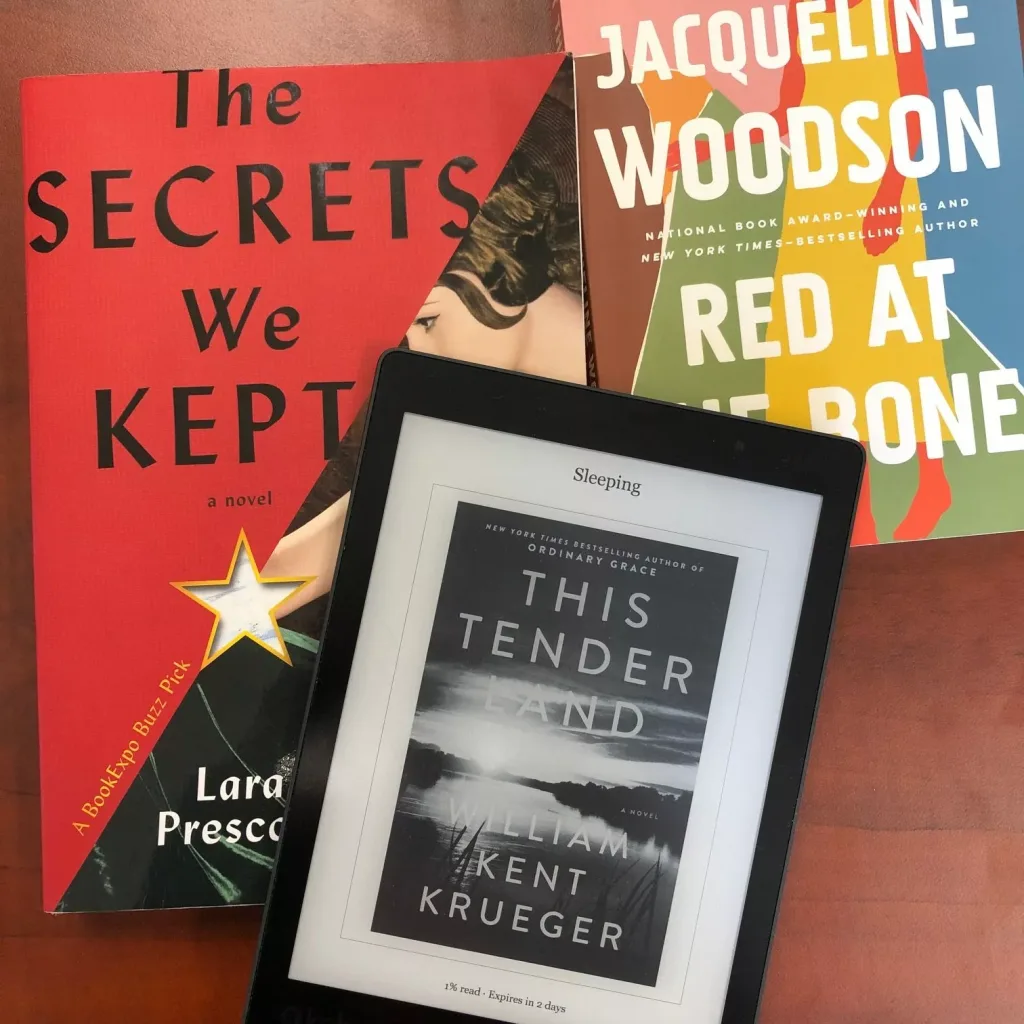We’re All Adults Here
Book Recommendations & Other Musings
by Carol Tuttle
 We Have a Winner. Or FOUR.
We Have a Winner. Or FOUR.
Librarian jobs aren’t known for stellar paychecks, but a perk of the job is access to books before they are published. Book publishers provide Advance Reader Copies (ARCs) to the librarians who will write reviews, who have influence on what libraries buy and what gets suggested to readers. This month is record-setting for me: I have already read FOUR of the books on the LibraryReads Top Ten list for books being published this month. Have you heard of LibraryReads? Each month, public library staff participating nationwide vote for their favorite upcoming fiction and non-fiction books. Then the Top Ten of these collective favorites, a “Staff Picks” if you will, are announced by LibraryReads. This Top Ten list is a great way to look for a book to read next, recommended by librarians from the entire country. There’s even an archive of previous picks (dating back to 2013) that is a great source for finding something good to read.
For September, four of my picks made the list! The first is a by a debut author, and the other three are by well-loved veteran authors. Be sure to place your holds: these are going to be popular.

The Secrets We Kept by Lara Prescott
So much more than spies and intrigue, this novel weaves secrets of the state, of friendships, of sexual attraction and romance. The historical and multinational settings draw the reader into a complex web that begs to be resolved. The power of literature is used as a major tool for reaching people under control of the Soviet government. I cheered for strong women making their way in a career dominated by men. l cheered for women whose loves struggled in defiance of cultural standards. The story behind the story, this novel gives a perspective of the novel Doctor Zhivago that I never knew. Prescott writes in a clear, direct style with an assortment of characters. Each character has a story to tell, and in this novel, they are all compelling.

Red at the Bone by Jacqueline Woodson
Sometimes the burden of history can prevent the joy of hope for future generations. How much should parents tell their children? Past events can inform future choices, but too much information can have a devastating effect. This beautifully written novel peels back the history and perspectives of family members whose trauma of previous generations makes them afraid and skeptical. The experiences of parents and grandparents (and even great-grandparents) echo in Melody’s own life. Iris, Sabe and Po’Boy hold their breath on what the future will bring, finding it hard to embrace the wonder Melody can become for them. Woodson writes with a delicate hand of difficult topics and myriad perspectives, skillfully weaving the narrative of the characters. I couldn’t stop reading, and once I had finished, returned to the start and began again.

The Dutch House by Ann Patchett
First a disclaimer: I love Ann Patchett novels. Commonwealth and Bel Canto are probably my favorites, although Run was also memorable and influential. Once again, Ann Patchett excels at telling a unique story with universal themes. As shown by the book’s title, the house is the focus of the life of the Conroy family. It symbolizes the impact of wealth on the family, both what wealth builds and what it erodes. Danny Conroy and his sister Maeve, who grew up in the house, have a bond that sustains them across decades. It is this sibling relationship more than any other that nurtures them through hardship and pain inflicted by the adults in their lives. But they struggle to break out of the habits and misconceptions that hold them back from fully living. Two people can emerge from an experience with distinctly different perspectives of what happened and what it meant. And what it will mean in the future.

This Tender Land by William Kent Krueger
This superb novel of journeys is set in the upper Midwest in 1932, but the internal and societal struggles explored are timeless. Author William Kent Krueger (known for his Cork O’Connor series) is a gifted storyteller. His voice is heard clearly through Odie, and the reader senses the autobiographical nature of this standalone novel. Conditions are unbearable at the institutional school where orphan Odie and his brother Albert are confined. Along with two other children from the Lincoln School (Native American orphan Mose and Emmy, a teacher’s young daughter) they escape in a canoe and head downriver. Reminiscent of Twain’s Huck and Jim, the children deal with life and death, good and bad people, love and racism, and grow up along the way. There are questions posed: What constitutes a family? Why do bad things happen to good people? Is it too painful to love someone since they may be taken away? What are we searching for in life? Odie wrestles with his faith during the story. He tries to reconcile the things he sees and experiences with the concept of God as he has been taught. Krueger includes spiritual and almost magical events in the novel, not pushing the reader to suspend belief, but rather consider these as coincidences and miracles of an ordinary lifetime. This Tender Land is a novel that enthralls with an immersive story that makes the reader think deeply about the journey of life and the nature of the spirit that carries us. William Kent Krueger can be trusted to leave us with a message of hope.
Carol Tuttle is the Collection Services Librarian for the Willoughby-Eastlake Library System. She is currently reading Olive, Again by Elizabeth Strout (if you loved Olive Kitteridge, you’ll love this sequel).

